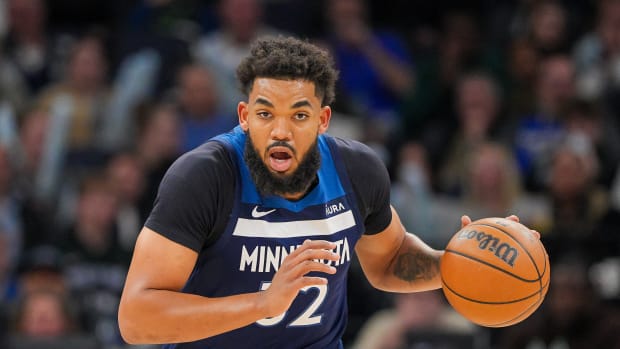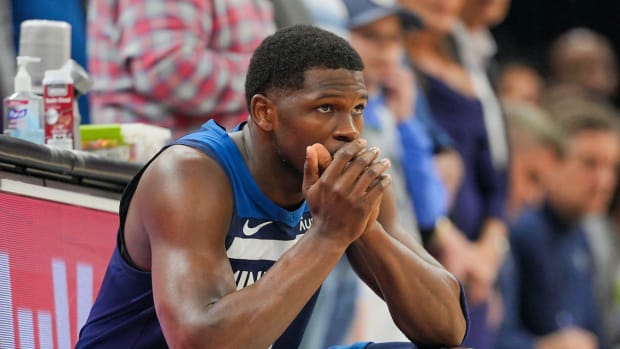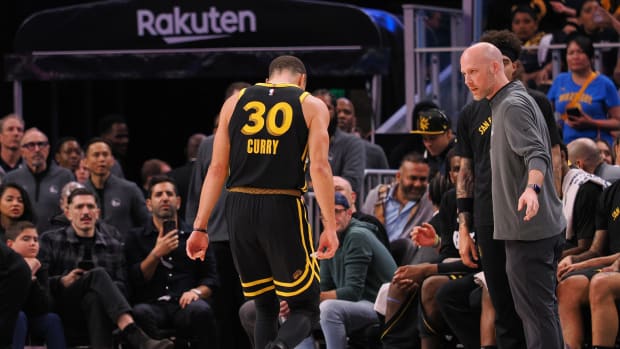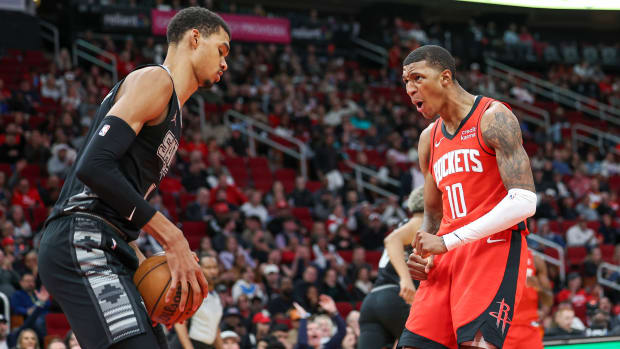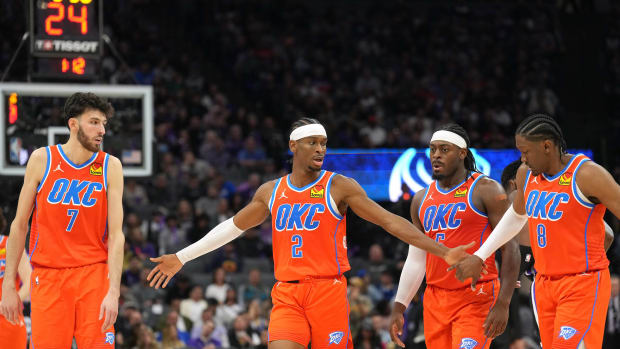Stephen Curry, Warriors turn Finals rematch into lost cause for Cavaliers
The NBA’s relentless regular season schedule pauses, from time to time, for two truly elite teams to gauge their progress. Monday was thought to be just such an occasion; the Warriors and Cavaliers, defending champions of their respective conferences, met in Cleveland for a holiday showcase. It would be just their second meeting since slogging through last year’s Finals and their last meeting of the season until a possible Finals repeat.
Should that matchup come to pass, this game suggests the result will be similar—if not more lopsided. The Warriors’ lead was built in the opening minutes, the game was already a blowout by halftime and the starters exited for good at the end of the third quarter. The final score landed at 132–98, though not before James was handed the most lopsided in-game margin of his 12-year career. The result also amounted to the largest home loss in James’s career.
NBA Power Rankings: Spurs take over No. 1 as season hits its midway point
Curry was right to wonder if the visitors’ locker room still smelled of champagne. Not much in this matchup has changed on the Cavs’ side, even now that Kyrie Irving and Kevin Love are back in the lineup. Something in their outmatched performance still reeks of June.
That stale reality showed as Cleveland played through varying shades of hopelessness on Monday night. Maintaining a successful team defense in the NBA demands prompt, smart rotation on the back line. This seemed to escape the Cavaliers. The geometry of a Stephen Curry–Draymond Green pick-and-roll still perplexes this group, as it does many defenses. The difference is that most quality teams are able to at least offer some mild resistance, whereas Cleveland rarely kept up beyond the initial rotation. Golden State came with precision and determination, pushing past the Cavaliers’ flimsy resistance to create an open three-pointer or a clear layup on command. This only led to desperate overplaying against Curry (35 points on just 18 shots) and others, which left room for the Warriors’ back cuts and created more frustration among Cleveland’s defenders. In games like this against an opponent so potent, discouragement takes hold early and festers.
The 2015 NBA Finals were at least superficially close, for the most part, even if Golden State began to solve the series’ riddles roughly midway through. Now the Warriors seem to approach every game with the Cavaliers as if holding an answer key. Cleveland tried forcing Green to make the right play, over and over, and yielded a 16-point, 10-assist, seven-rebound near-triple double to the inevitable All-Star. The Cavs tried sticking to perimeter shooters at the risk of leaving a big man open and lost just enough points on lobs and drop-offs to sink the strategy. They attempted to pre-rotate to handle those big men lurking inside at the cost of defending the corner three, allowing Andre Iguodala (20 points, five assists, 4-of-5 3FG) and Harrison Barnes (12 points, 2-of-5 3FG) to hoist up jumpers unbothered.
• WATCH: Cavaliers’ Smith ejected after running over Warriors’ Barnes
Of course, it’s easier to get into all of the actions above when a team runs as the Warriors do. Officially, the tally of fast-break points leaned 17–2 in Golden State’s favor. Unofficially, it seemed somehow worse; the Warriors might be the most deadly secondary break team in the league, as the initial push only gives way to a trailing Curry, Green or Klay Thompson. Golden State had floundered a bit of late by its historic standards, dropping two of its last three games—including a blowout loss of their own by way of the Detroit Pistons—for the first time all season. A win like this one marked a return to normalcy; the Warriors locked down defensively and made shots as they largely have over the past two seasons, turning a talented Cavs team into just another of their hapless victims.
Cleveland is a good team with the kinds of distinct individual advantages that put subpar opponents at a loss. Those advantages have thus far failed to translate to contests against the NBA’s best. The Warriors, armed with the personnel needed to curb Cleveland’s offense and the execution necessary to work over its defense, stretched that tilted trend to an absurd magnitude. A marquee game was wasted in the balance, transformed into a punchline that was every bit at Cleveland’s expense.































